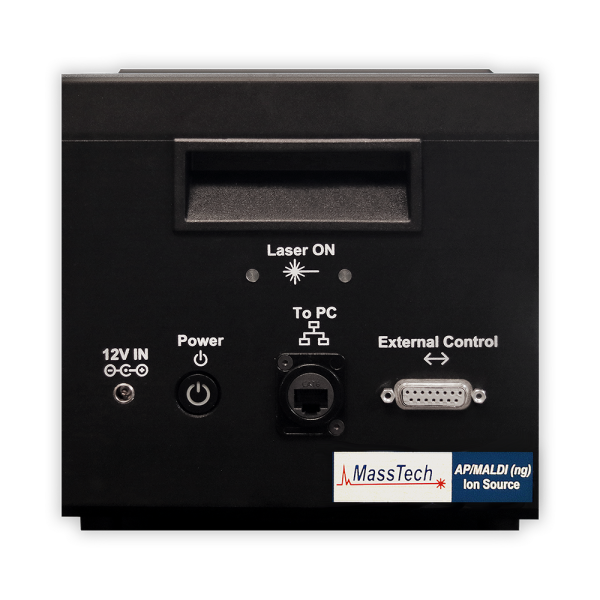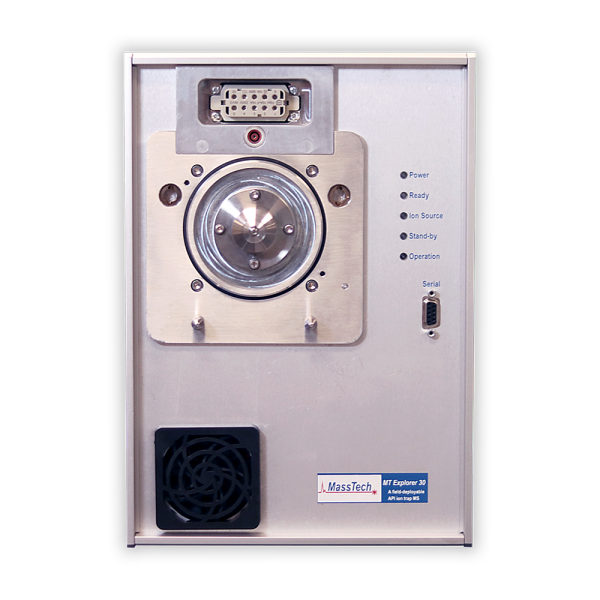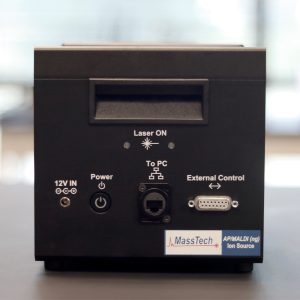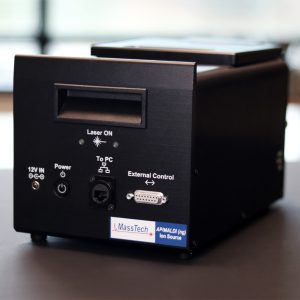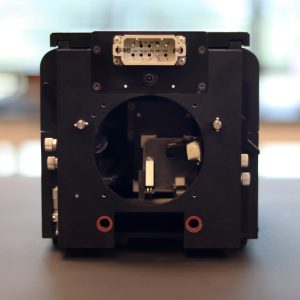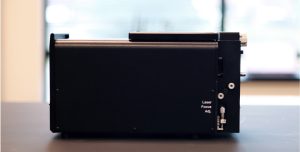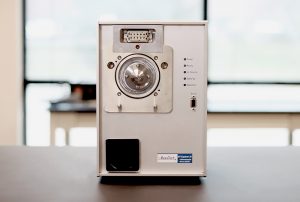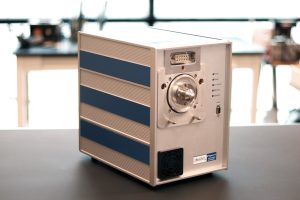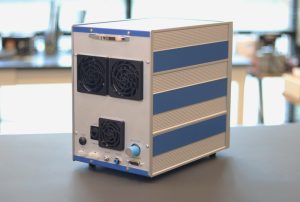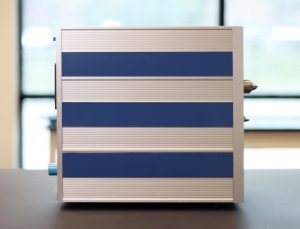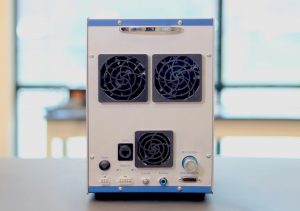X
Key Features
Ease of use
- Easily interchangeable: ESI to AP/MALDI in minutes!
- No need for a separate MALDI instrument
Compact design
- 33cm (L) x 17cm (H) x 18cm (W) (13” (L) x 6.7” (H) x 7” (W))
- 6 kg (13.2 lbs)
Built to last
AP/MALDI high throughput spot analysis and imaging with:
- High resolution MS analyzers such as Orbitraps™ and QTOFs
- Low resolution MS analyzers such as Triple Quadrupole MS and Ion Traps
High spatial resolution
- HR (High Resolution): 20-60um
- UHR (Ultra High Resolution): sub-10um
Ionization at ambient pressure
- Soft ionization
- Favorable for tissue analysis
- Wide range of MALDI matrices including volatile matrices.
Highly accurate micro-step XY stages
High resolution CCD camera
Automated data acquisition through contact closure cable
Advanced imaging and data acquisition software
Comprehensive, bundled imaging packages available, including:
- MALDI spotter and sprayer
- Image processing software
- Tailored onsite/offsite training modules
Dedicated world-wide customer support and service network
Compatibility
Compatibility With Various Mass Spectrometers:
AP MALDI ionization is designed to be compatible with Mass Spectrometers from major manufacturers. Its versatility allows seamless integration with different instruments. AP/MALDI can be coupled with high-resolution Mass Spectrometers, enabling accurate analyses, and demonstrating exceptional performance in producing accurate mass MALDI.

Contact us to determine model compatibilities.
Swift Transitions and Interfacing:
Due to its atmospheric pressure interface, AP MALDI enables swift transitions between different ionization methods. The switch from an ESI source to the AP/MALDI source can be accomplished in minutes, if not seconds, making it a practical solution for laboratories with intermittent MALDI requirements.
HR/UHR
What is HR? UHR?
The high resolution (HR) AP/MALDI source is equipped with an optical stage which can focus down to 50 micron laser dot size (resolution). Our ultra-high resolution (UHR) option has an optical package with a precision to allows for sub-10 micron resolution. For work that does not require sub-10 micron resolution, the HR package is an economical option that provides its user with every other improvement that the (ng) platform delivers. For imaging applications, we recommend upgrading to the UHR model.
Software
Target-Next AP/MALDI Imaging Software:
MassTech’s own Target-next is a control software for the MassTech AP/MALDI ion source, designed for high resolution mass spectrometry imaging experiments (MSI).
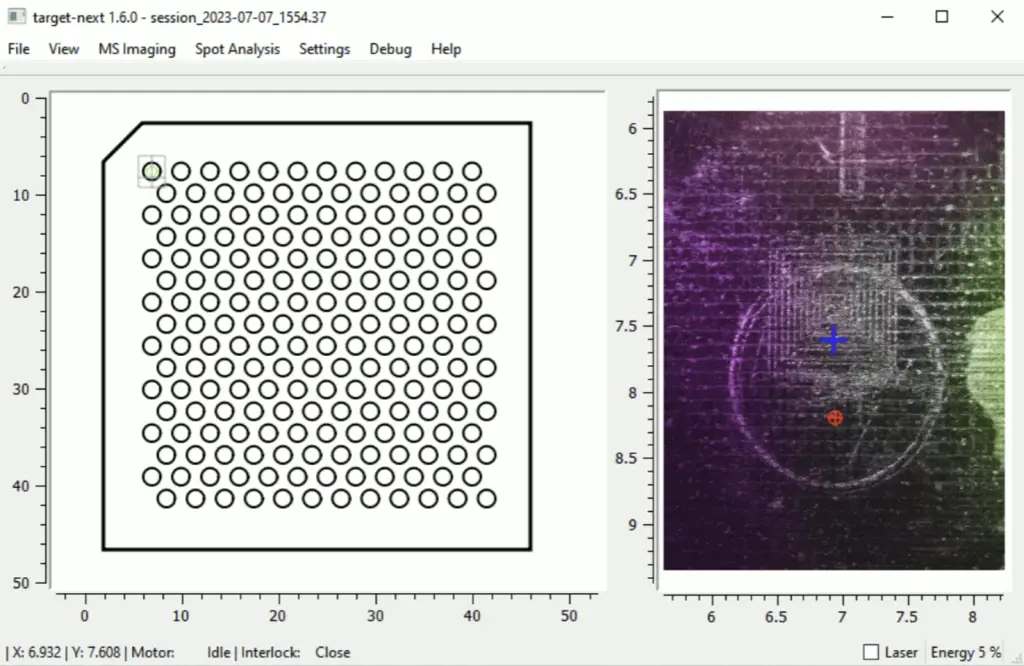
Target-next software user interface
Target-next supports ‘optical preview’ generation using the built in CCD camera in AP/MADLI, and the import of high-quality optical images of the sample surfaces. These features facilitate ‘imaging area selection’ (a.k.a. ‘regions-of-interest’ (ROIs)) for subsequent MSI experiments.
Our imaging software also provides hardware means for synchronization with the mass spectrometer including remote mass spectrometer start and chromatograph style operation, which allows users to analyze multiple samples in a single experiment.
All experiment data including selected imaging areas, XY stage travel logs, optical images, and laser status report are collected automatically and available for further analysis.
Companion applications allow the user to review stored results and combine them with the mass spectrometer raw data by creating a data file in the imzML format, as described in this publication by Römpp et.al.
Images
X
Key Features
Atmospheric Pressure Interface (API)
Compatible with various atmospheric pressure ionization sources
Versatile platform for a wide range of applications
Variety of rapidly interchangeable sources
- Direct sampling (DSAP and LDSAP)
- Chemical ionization (APCI)
- Electrospray ionization (ESI) and more
High Mass Range
- 35-2000 Da range with customizable options
- Positive and negative ion modes
- Comprehensive coverage for diverse molecular species
Compact, User Friendly Design
- Small footprint
- 20 x 31 x 33 cm | 13 x 8 x 12 in
- 17kg | 37.5 lbs
- Designed for space-constrained laboratories and field work
- Suited for users at every level of expertise and experience.
- Robust, oil-free vacuum setup
- Simple to use and easy to maintain.
Low Power and Material Consumption:
- Full analytical capabilities with a fraction of the power consumption
- 90-264 VAC Power Adapter
- Uninterrupted operation with battery backup option
- MS capabilities with 24VDC battery
- Small analyte, solvent, and consumables requirements without compromising data acquisition
Specs
PARAMETER
Mass Analyzer Type:
Mass Range:
Mass Resolution:
Mass Accuracy:
Mass Scan Rate:
Throughput Rate:
MS Capabilities:
Ion Modes:
Source of Buffer Gas:
Interface Type:
Capillary Temperature Range:
Ion Sources Available:
Control Station:
Communication:
Power Consumed:
Dimensions:
Weight:
Transportation:
VALUE
3D quadrupole ion trap
35 up to 2,000 Da
Better than 0.5 Da
Better than 0.25 Da
Up to 4,000 Da/sec
Up to 5 spectra/sec
MS, MS/MS, MS n
Positive and negative
Metal hydride container
(no compressed gas cylinder used)
Atmospheric pressure interface (API)
200-300°F (95-150°C)
ESI, nanoESI, APCI, secondary ESI,
AP-MALDI, DART, SICRIT
Laptop PC
TCP/IP Protocol
90-264 VAC power adapter; or
24VDC battery (ordered separately); 250 W max (MS only)
8” x 12” x 13”
22cm(W) x 31cm(H) x 33cm(L)
37.5lbs (17kg)
Wheeled hardshell protective case
30cm(W) x 42cm(H) x 55cm(L)
MODAS® MT Explorer 30 Control Software
MassTech’s own MODAS® control software is designed for total parameter control of the MT Explorer 30’s interactive features.
MODAS® provides an easy to use and easy to optimize platform for your analytical needs. Instantly change the voltage settings, scan parameters, scan range and more. The MODAS® software provides instantaneous feedback of instrument functions and settings, such as pump operation and capillary temperature.
ChromExplorer Data Analysis Tool
MassTech’s MS data analysis software ChromExplorer allows for instant data viewing of a run recorded in MODAS®. ChromExplorer provides a platform to view spectra and Total Ion Count (TIC), and export spectra (ASCII files), peak lists, mascot files, and more in a user friendly, convenient package.
Images

